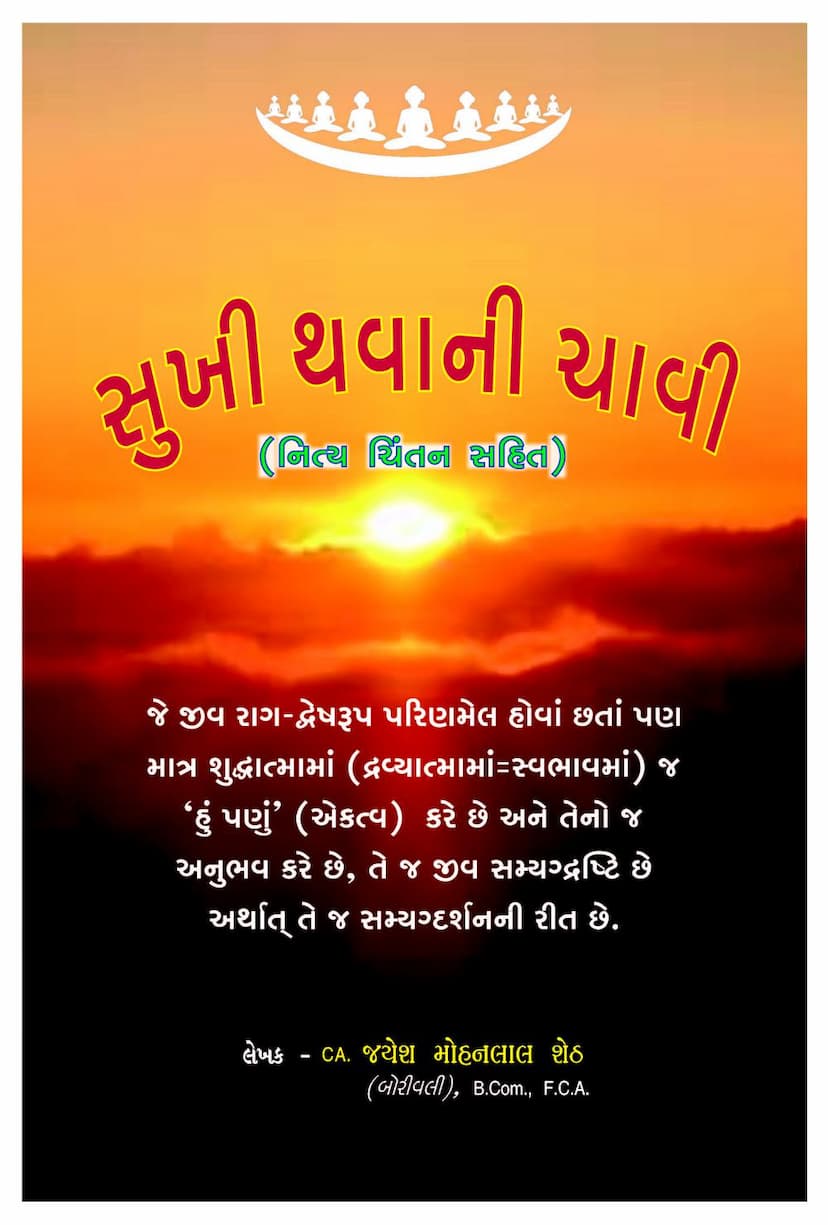Sukhi Thavani Chavi
Added to library: September 2, 2025

Summary
This Jain text, "Sukhi Thavani Chavi" (The Key to Being Happy), authored by Jayesh Mohanlal Sheth, presents a path to true and lasting happiness through the principles of Jainism. The book aims to provide a simple and direct method for achieving self-realization and ultimately, liberation (moksha).
Here's a comprehensive summary of its key themes and teachings:
Core Message: The Key to Happiness is Samyak Darshan (Right Faith/Vision)
The central thesis of the book is that true happiness is found not in worldly pleasures, which are temporary and lead to suffering, but in Samyak Darshan. This is described as the state of realizing the pure soul (Shuddhātma) as one's true self, even amidst attachment and aversion (rāg-dveṣ). The book emphasizes that even if one is caught in worldly attachments, identifying solely with the pure soul is the essence of Samyak Darshan.
Understanding Happiness: Two Types
The book distinguishes between two types of happiness:
- Physical/Sensory Happiness (Shaaririk-Indriyajanya Sukh): This is the happiness derived from health, wealth, family, and sensory pleasures. It is acknowledged that these are fleeting and temporary.
- Spiritual/Soul Happiness (Ātmic Sukh): This is the eternal and blissful happiness derived from the soul itself. This is the ultimate goal.
The Path to Spiritual Happiness:
The book advocates for the following principles and practices:
- Understanding Karma and Destiny: It explains that present happiness and suffering are the results of past good (punya) and bad (pāp) karma. To improve one's destiny, one must cease committing major sins and engage in practices that generate punya.
- Avoiding Sins: The text strongly advises against major sins such as:
- Consuming root vegetables (kandmool), which involve infinite life forms.
- Eating at night (ratribhojan).
- The seven major vices (sapt-mahavyasan): gambling, alcohol, meat, prostitution, theft, hunting, and adultery.
- Consuming forbidden items (abhakṣa-bhakṣa).
- Earning wealth through unjust means.
- Repentance and Renunciation (Pratikraman and Pratyakhyan): When experiencing suffering, the book encourages acknowledging one's past wrongdoings (pāp), repenting for them, and resolving not to repeat them. This process of introspection and commitment is crucial.
- The Importance of Right Understanding (Samyak Darshan):
- It clarifies that mere external rituals or faith in deities without genuine understanding of the soul is not true Samyak Darshan.
- True Samyak Darshan involves realizing the soul's true nature and differentiating it from the physical body and other matter.
- This realization is achieved through self-experience and discrimination (bhed-jnān).
- The Nature of the Soul (Ātmā): The book explains that the soul is inherently pure and blissful, similar to a Siddha (liberated soul). The impurities (rag-dveṣ) are like dirt in water, which can be cleansed to reveal the pure soul.
- Meditation (Dhyan): Different forms of meditation are discussed, highlighting the importance of focusing the mind on spiritual matters. It warns against meditations that strengthen the identification with the body.
- The Twelve Reflections (Bār Bhāvanā): These are a series of contemplations on impermanence (anityā), helplessness (aśaraṇ), the nature of the world (saṃsār), oneness (ekatva), otherness (anyatva), impurity (aśuci), influx of karma (āsrav), stoppage of karma (saṃvar), cessation of karma (nirjarā), the nature of the universe (lokasvarūp), the rarity of right vision (bodhi durlabh), and the true nature of dharma.
- Daily Practices: The book outlines a disciplined daily routine including:
- Waking up before sunrise.
- Reciting the Namaskar Mantra with understanding.
- Performing daily confessions and repentance (pratikraman).
- Taking vows and restrictions (pratyakhyan).
- Cultivating positive mental states.
- The Meaning of Death (Marana): Death is presented not as an end but as a transition of the soul from one body to another. Grief arises from attachment (moha), not from the natural process of death.
- Preparation for Samadhi Marana (Peaceful Death): The ultimate preparation for a peaceful death is the attainment of Samyak Darshan in life. This means living a life dedicated to spiritual understanding and practice.
- Avoiding Worldly Attachments: The book stresses the need to detach from the body, possessions, and family, viewing them as temporary.
- Living a Virtuous Life: It emphasizes the importance of virtues like contentment, simplicity, equanimity, tolerance, humility, discretion, and above all, chastity (brahmacharya).
- Discrimination in Actions: The text advises against unnecessary worldly pursuits like excessive celebrations for birthdays or weddings. Instead, these occasions should be opportunities for religious reflection and practice.
- The Power of Punya (Merit): The book acknowledges the role of punya in acquiring wealth but strongly advocates prioritizing dharma over material pursuits.
- Right Company and Guidance: Seeking the company of virtuous souls and following the teachings of true spiritual guides are encouraged.
Key Takeaways:
- True happiness is internal and found in the soul, not in external possessions or experiences.
- Samyak Darshan (Right Faith/Vision) is the absolute prerequisite for spiritual progress and liberation.
- Cultivating detachment, practicing virtues, and understanding the law of karma are essential steps.
- A disciplined daily routine of spiritual practices is vital for progress.
- The ultimate goal is to realize the soul and achieve liberation from the cycle of birth and death.
In essence, "Sukhi Thavani Chavi" is a practical guide that distills the profound teachings of Jainism into actionable advice for anyone seeking lasting happiness and spiritual fulfillment. It emphasizes that the key lies within oneself, accessible through self-realization and adherence to righteous principles.